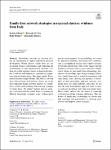Item Infomation
Full metadata record
| DC Field | Value | Language |
|---|---|---|
| dc.contributor.author | Stefano, Ghinoi | - |
| dc.contributor.author | Riccardo De, Vita | - |
| dc.contributor.author | Bodo, Steiner | - |
| dc.date.accessioned | 2023-05-04T02:59:12Z | - |
| dc.date.available | 2023-05-04T02:59:12Z | - |
| dc.date.issued | 2023 | - |
| dc.identifier.uri | https://link.springer.com/article/10.1007/s11187-023-00755-5 | - |
| dc.identifier.uri | https://dlib.phenikaa-uni.edu.vn/handle/PNK/8380 | - |
| dc.description | CC BY | vi |
| dc.description.abstract | Knowledge networks in regional clusters are fundamental to support innovation and local development. Within clusters, family firms are key in creating business opportunities and supporting the establishment of inter-organizational networks. Yet, their role within regional clusters for knowledge transfers is still not well understood, especially in comparison with non-family firms. This paper applies Exponential Random Graph Models (ERGMs) to network data collected from the Parabiago cluster, one of the most important Italian footwear clusters, to contribute to a better understanding of the network strategies of family firms. We identify distinct network strategies associated with the cluster firms, accounting for different knowledge exchange types: technological, market, and managerial. In our modelling, we control for firm-level attributes and dyadic-level attributes, such as geographical distance and cognitive proximity between cluster firms. | vi |
| dc.language.iso | en | vi |
| dc.publisher | Springer | vi |
| dc.subject | Family firm network strategies | vi |
| dc.subject | evidence from Italy | vi |
| dc.title | Family firm network strategies in regional clusters: evidence from Italy | vi |
| dc.type | Book | vi |
| Appears in Collections | ||
| OER - Kinh tế và Quản lý | ||
Files in This Item:

